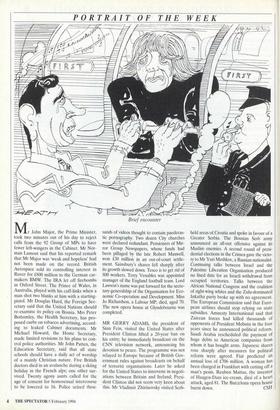PORTRAIT OF THE WEEK
Mr John Major, the Prime Minister, took two minutes out of his day to reject calls from the 92 Group of MPs to have fewer left-wingers in the Cabinet. Mr Nor- man Lamont said that his reported remark that Mr Major was 'weak and hopeless' had not been made on the record. British Aerospace sold its controlling interest in Rover for £800 million to the German car- makers BMW. The IRA let off firebombs in Oxford Street. The Prince of Wales, in Australia, played with his cuff-links when a man shot two blanks at him with a starting- pistol. Mr Douglas Hurd, the Foreign Sec- retary said that the United Nations should re-examine its policy on Bosnia. Mrs Peter Bottomley, the Health Secretary, has pro- posed curbs on tobacco advertising, accord- ing to leaked Cabinet documents. Mr Michael Howard, the Home Secretary, made limited revisions to his plans to con- trol police authorities. Mr John Patten, the Education Secretary, said that all state schools should have a daily act of worship of a mainly Christian nature. Five British doctors died in an avalanche during a skiing holiday in the French alps; one other sur- vived. Twenty agony aunts called for the age of consent for homosexual intercourse to be lowered to 16. Police seized thou-
sands of videos thought to contain paederas- tic pornography. Two dozen City churches were declared redundant. Pensioners of Mir- ror Group Newspapers, whose funds had been pillaged by the late Robert Maxwell, won £30 million in an out-of-court settle- ment. Sainsbury's shares fell sharply after its growth slowed down. Tesco is to get rid of 800 workers. Terry Venables was appointed manager of the England football team. Lord Lawson's name was put forward for the secre- tary-generalship of the Organisation for Eco- nomic Co-operation and Development. Miss Jo Richardson, a Labour MP, died, aged 70. The new opera house at Glyndebourne was completed.
MR GERRY ADAMS, the president of Sinn Fein, visited the United States after President Clinton lifted a 20-year ban on his entry; he immediately broadcast on the CNN television network, announcing his devotion to peace. The programme was not relayed to Europe because of British Gov- ernment rules against broadcasts on behalf of terrorist organisations. Later he asked for the United States to intervene in negoti- ations between Britain and Ireland; Presi- dent Clinton did not seem very keen about this. Mr Vladimir Zhirinovsky visited Serb-
held areas of Croatia and spoke in favour of a Greater Serbia. The Bosnian Serb army announced an all-out offensive against its Muslim enemies. A second round of presi- dential elections in the Crimea gave the victo- ry to Mr Yuri Meshkov, a Russian nationalist. Continuing talks between Israel and the Palestine Liberation Organisation produced no fixed date for an Israeli withdrawal from occupied territories. Talks between the African National Congress and the coalition of right-wing whites and the Zulu-dominated Inkatha party broke up with no agreement. The European Commission said that Euro- pean airlines should stop relying on state subsidies. Amnesty International said that Zairean forces had killed thousands of opponents of President Mobutu in the four years since he announced political reform. Saudi Arabia rescheduled the payment of huge debts to American companies from whom it has bought arms. Japanese shares rose sharply after measures for political reform were agreed. Fiat predicted an annual loss of £706 million. A woman has been charged in Frankfurt with cutting off a man's penis. Reuben Mattus, the inventor of Haagen-Dazs ice-cream, died of a heart attack, aged 81. The Barcelona opera house


















































 Previous page
Previous page